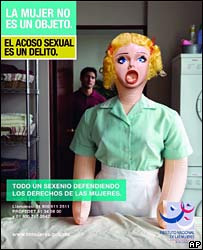 |
 |
 |
 News Around the Republic of Mexico | March 2006 News Around the Republic of Mexico | March 2006  
Sex Dolls Fight Mexican Machismo
 Mark Stevenson - Associated Press Mark Stevenson - Associated Press


| | "Sexual harassment is a crime," reads the printed ad. |
Mexico City — Mexican television is showing jarring scenes of inflatable sex dolls dressed as office workers — part of a campaign by Mexico's National Women's Institute to dramatize the problem of sexual harassment in the workplace.

The television part of the campaign — which also includes billboards and radio ads — shows the wide-mouthed sex dolls dressed as secretaries, sitting at desks or photocopiers as men leer at them or try to grope them.

"No woman should be treated like an object," a somber-voiced narrator says in the background. "Sexual harassment is not just demeaning, it's a crime."

Launched on International Women's Day, the campaign will run through mid-April, said Patricia Espinosa, head of the institute.

Recently, the institute also sponsored a series of controversial ads against domestic violence in which prominent female writers, actresses and academics appeared on billboards, made up to appear as if they had been severely beaten.

The slogan of that campaign was "He who hits one of us, hits all of us."

Mexican officials acknowledged on Wednesday that the country still has a problem with machismo, discrimination, harassment and violence against women.

"Our society still has a long way to go in overcoming holdovers from the past, eradicating prejudice and changing habits," President Vicente Fox said.

Fox himself drew criticism from anti-discrimination groups and legislators when he joked that "75 percent of the homes in Mexico have a washing machine, and not the kind with two hands or two legs."

"Apart from whether it was intentional ... there are certain forms of expression that stereotype and create prejudices toward women, and that translates into a sexist language," Gilberto Rincon, president of the National Committee to Prevent Discrimination, wrote in a letter to Fox made public Tuesday.

On Wednesday, front-running leftist presidential candidate Andres Manuel Lopez Obrador promised to give at least half the posts in his cabinet to women, should he win the July 2 election.

Attorney General Daniel Cabeza de Vaca noted that "violence against women is present in all classes of society, regardless of education levels, and is also present in the workplace and in the family."

In neighboring Guatemala — which has experienced a three-year spike in the killings of women, often involving gang or domestic violence — the government acknowledged the country is one of the most dangerous in the world for women.

About 625 women were killed in Guatemala in 2005 — more than triple the 2002 death toll of 184. Guatemala has a population of 14 million.

"The most recent data show a murder rate of 9.02 per 100,000 women in Guatemala, a rate that is second only behind Russia," said Sergio Morales, the country's human rights prosecutor. | 
 | |
 |



